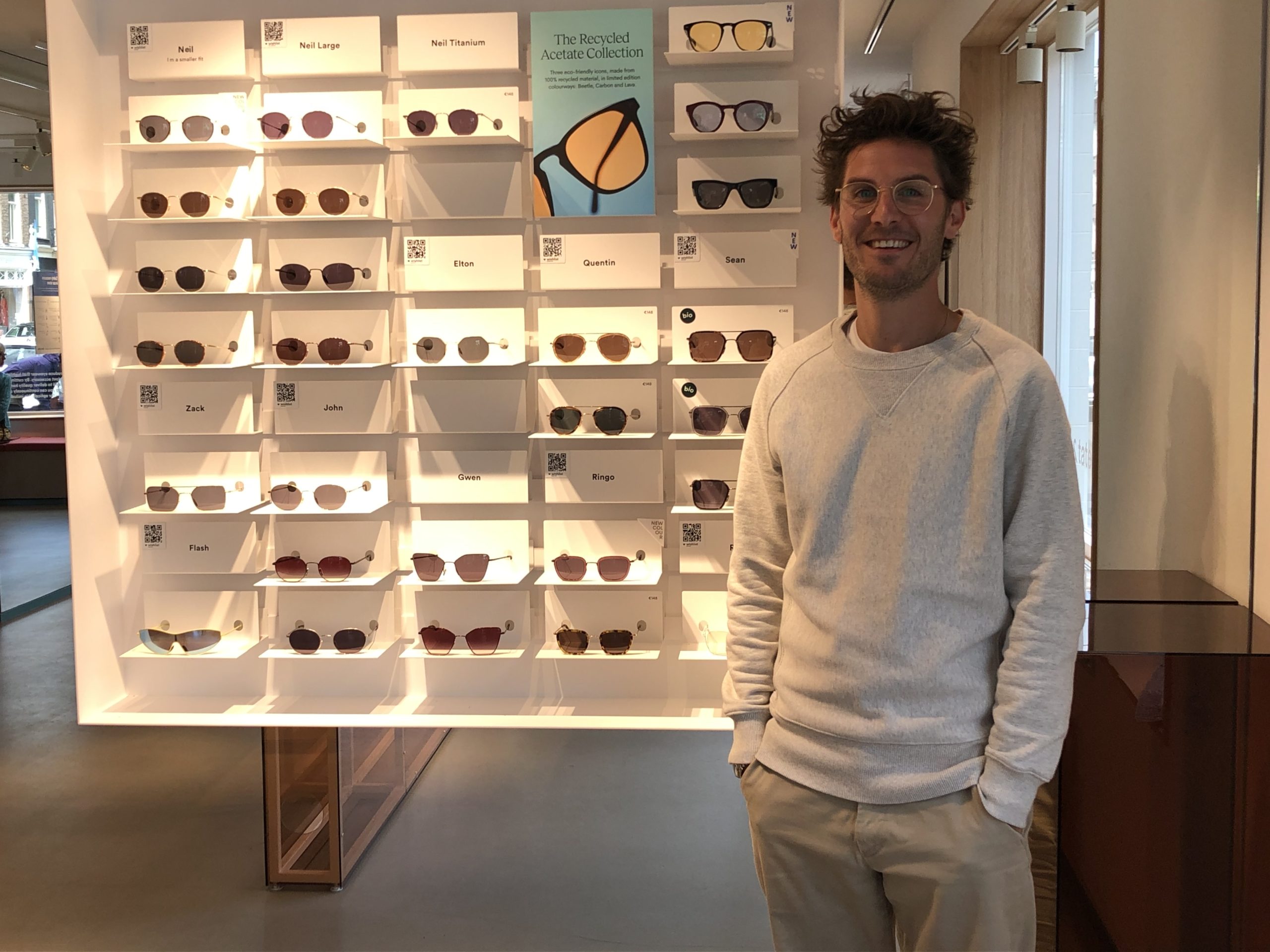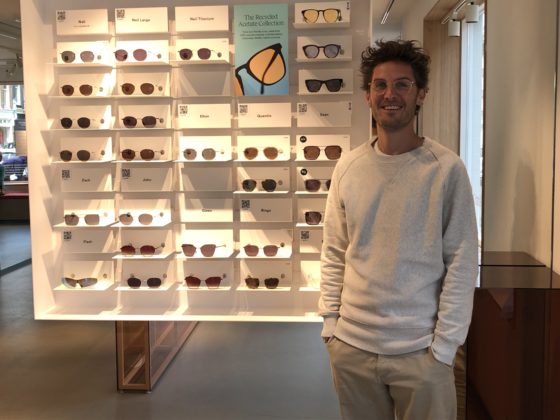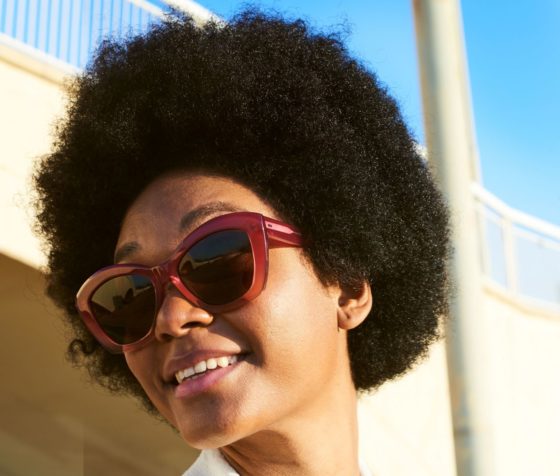The Dutch glasses company that wants to crack the competition


When you go to the optician, do you need an extra pair of glasses to read through the fine print of the ‘three for one’ offer?
That’s not what Mark de Lange wants for his customers. Seven years ago, with no background in eyewear, the Dutchman from Laren set up Ace & Tate with the aim of making buying glasses more ‘transparent, friendly and fun.’
Now he has a company with more than 60 stores, 600 employees in 10 countries and in the middle of the coronavirus crisis in July won a cash injection of €14.25 million for further expansion. He still wears slacks and sneakers – preferring to dress up or down his look, he says, with eyewear or contact lenses – and gets hands on to ensure a window display of lens cleaner bottles is perfectly symmetrical when he goes into a store.
But the 38-year-old also wants to be a force in eyewear retailing, offering the kind of experience that ‘generation Y and Z’, as well as time-strapped mums and dads, appreciate: a company where you can browse online, use technology to find the best fit, order glasses to try on at home, or go to a store for the complete personal service (or, indeed, a mixture).
‘Ace & Tate is an honest and straightforward voice in eyewear retailing, with creative campaigns, collaborating with names we admire and trying to be very customer centric,’ he tells DutchNews.nl earnestly, sitting in a nearby café because his store has reached its corona numbers limit.
‘It has always been a young brand, with a younger approach to eyewear retailing, which can feel a bit stuffy. It seems very serious when you go buy a pair of glasses – and we take our responsibility seriously but it’s still a very fun accessory that can help somebody define their personality.’
Acetate
Ace & Tate might sound like a British law firm but it is actually named after acetate, that useful, flexible and colourful material which makes up many modern frames. Appropriately, its digital-ready operation made it similarly flexible in the lockdown.
‘We saw revenues drop considerably but for us it wasn’t terrible: we still sold online,’ says De Lange. ‘This year is basically done, there was lost revenue, but it didn’t hurt. It’s only added to my belief that unified commerce is the way forward. This is probably not the only pandemic that will happen in the future, so we need to expect the unexpected.’
In the background, some glasses giants seem to be in stiffer times. A controversial takeover deal between the world’s largest firm EssilorLuxottica (which makes Ray-Bans) and GrandVision (owner of Pearle opticians) seems to be breaking down amid court battles and apparent losses of more than 25% during the coronavirus lockdown for GrandVision stores.
The European Commission’s head of competition policy Margrethe Vestager has expressed doubts about whether ever-fewer optical companies will mean ‘higher prices or reduced competition for consumers when they visit their local optician.’

So is this an opportunity for Ace & Tate, which is still privately owned, likes its cool advertising campaigns and collaborations with local designers but also prides itself on its two simple, mid-range prices: €98 or €148?
De Lange thinks so. He started the firm as a frustrated consumer who had bought back some swish frames from a trip to New York and wondered why it took six weeks to get his lenses put in back home, and why the sales assistants were still trying to sell him multiple, confusing add-ons.
‘It’s really strange in this consumer age,’ he says. ‘When we started out, there would be companies advertising three pairs for the price of one but when you actually walked in, you would basically get one pair for the price of three. I like to know, as in every store I walk in, that these jeans are €120, and I won’t pay €300.
‘So from the beginning we had a flat price structure, with glasses for €98 and for higher prescriptions we would add higher index lenses and that would be on us. Nowadays we have glasses at €98 and €148 as titanium is more expensive, but we are very transparent in the way we build pricing.’
The aim is also to make glasses a bit less formal and a bit more fun, he says: ‘It’s very medical when buying glasses. It’s all: this is how it should be and what you need – we try to flip that and make the customer central and follow their lead.’
Face masks
He points out that it’s curious to switch into a business suit but not switch glasses, and confesses that since he has chosen to wear contact lenses to talk to DutchNews.nl, he is a slightly different Mark. (Although he wears his top-selling Neil frames for a picture).
What’s next? He’s thinking about whether you might design glasses that work for facemasks without steaming up, at DutchNews.nl’s request, investigating new augmented reality technology to make glasses buying better and easier, and introducing used frames in a new part-exchange system to be a bit more eco-friendly.
‘We’ve found the model that works for us and now it’s about achieving more scale,’ he says, adding that he’s not planning to float the company any time soon. ‘We would like to become the go-to eyewear brand for gen Y and gen Z.’
The company is already too big for De Lange to name all of the frames, although the idea is still to be inspired by music stars (and all members of the Rolling Stones are paid tribute to). But as the bigger glasses conglomorates squabble among themselves, this Dutch company is clearly getting ready to rock and roll.
Thank you for donating to DutchNews.nl.
We could not provide the Dutch News service, and keep it free of charge, without the generous support of our readers. Your donations allow us to report on issues you tell us matter, and provide you with a summary of the most important Dutch news each day.
Make a donation